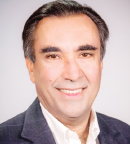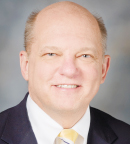
Sanjeev Arora, MD, MACP, FACG (left)

Ernest Hawk, MD, MPH
Cancer is the second-leading cause of death across the globe. Significant efforts, such as the National Cancer Moonshot Initiative and The University of Texas MD Anderson Cancer Center’s Moon Shots Program, will drive advances in cancer prevention, screening, and treatment. However, right now, these advances are not reaching everyone equally.
Gaps in knowledge transfer and access to high-quality care are significant contributors to inequity in health-care access: the most vulnerable patients are simply unable to get the right care in the right place at the right time. With the help of our colleagues around the world, we hope to change that.
Recent data show that rural Americans are more likely to die of cancer than their urban counterparts.1 Only 3% of medical oncologists practice in rural areas, forcing these patients to travel great distances for care.2
Further disparities in cancer care have developed in recent years, because advanced treatments are not accessible to all patients. For example, African American women in the United States die of breast cancer at a rate 40% higher than do non-Hispanic white women—a disparity that did not exist 3 decades ago.3,4 The situation is even worse in developing countries. For example, in Sub-Saharan Africa, the mortality rate for prostate cancer is more than double that in North America.5
We believe Project ECHO is an important and powerful tool in the fight to end cancer—particularly in rural and underserved areas, where the capacity to provide high-quality care is limited. However, collaborators are essential for advancing this mission.— Sanjeev Arora, MD, MACP, FACG, and Ernest Hawk, MD, MPH
Tweet this quote
Project ECHO
Project ECHO (Extension for Community Healthcare Outcomes) is an initiative that endeavors to increase best practice medical care to underserved people around the world and narrow these gaps in health care. With Project ECHO’s telementoring model of care, which pairs specialists at academic medical centers with primary care clinicians from rural and underserved areas throughout the United States and in other countries, physicians are able to deliver best-practice management of complex health conditions to patients in their communities. Developed in 2003 in New Mexico as a solution to a statewide crisis in hepatitis C, Project ECHO now works with 113 partners across the United States and 21 other countries on more than 55 different medical conditions.
A key innovation of Project ECHO is its Knowledge Networks, in which a multidisciplinary team of specialists shares their expertise and collaborates with numerous primary care teams to improve their capacity to deliver high-quality care in their communities. The “all teach, all learn” model increases access to specialty medical care in the patients’ communities without the need for additional providers or referrals to distant academic medical centers. Recently, the U.S. Senate and House of Representatives passed the ECHO Act to authorize further study of the impact of the ECHO model and how best to support its national expansion.6
Network of Global Experts
As innovative cancer prevention, screening, and treatment approaches continue to evolve, we believe the ECHO model could be valuable across the entire cancer care spectrum. However, to realize the full potential of this model to promote greater equity in cancer care delivery, we must develop a multidisciplinary, collaborative network of global experts. We are pleased that MD Anderson Cancer Center will now serve as an ECHO superhub for oncology. Its mission will be to train new ECHO hubs focusing on cancer prevention, screening, care management, and survivorship.
Together with Project ECHO, in 2014, we established an oncology-focused ECHO program with a project aimed at improving cervical cancer prevention, screening, and management services in Texas’ Rio Grande Valley, an underserved region along the Texas-Mexico border. Due to poor health-care access and a paucity of local providers, cervical cancer rates in this region are as much as 30% higher than in the rest of the state.
Using the ECHO model, members of the MD Anderson faculty work with local providers to better educate women about the importance of cervical cancer screening and vaccination for the human papillomavirus. Our faculty members also mentor providers regarding best practices for managing abnormal screening results, including colposcopies, cervical biopsies, and loop electrosurgical excision procedures, to prevent cervical cancer.
Through a number of successful partnerships, MD Anderson now works with local providers across Texas, Latin America, and Africa on projects focused on tobacco cessation, cancer survivorship, and palliative care, in addition to cancer prevention, screening, and care management. Moving forward, we envision a wide range of potential oncology-directed ECHO programs to train community health workers to provide prevention and wellness interventions, improve screening access, expand tumor boards, and share best practices from National Cancer Institute–designated cancer centers in the areas of cancer care, palliation, and survivorship.
Partnering With Community Physicians
Local providers report that ECHO programs improve both their knowledge and ability to deliver high-quality care to their patients, but the benefits are not unidirectional. Each of these programs is part of a larger strategy to improve access and increase community-based clinical capacity while facilitating regular communication and stronger engagement of academic centers with local front-line providers.
ECHO telementoring sessions are the foundation upon which rewarding relationships that foster ongoing collaborative research and training projects are built. Regular communication allows us to better understand the unique challenges of providing care in underserved regions and to promote new models of care delivery while continuing to strengthen our relationships.
We believe Project ECHO is an important and powerful tool in the fight to end cancer—particularly in rural and underserved areas, where the capacity to provide high-quality care is limited. However, collaborators are essential for advancing this mission.
Therefore, we ask you, our colleagues, to share the specific needs in your communities that may provide opportunities to utilize the ECHO model and better deliver innovative prevention, screening, and treatment approaches to those who need them most. To learn more about starting a Project ECHO in your community, visit Project ECHO at http://echo.unm.edu.
Disclosure: Drs. Arora and Hawk reported no potential conflicts of interest.
References
- Moy E, Garcia MC, Bastian B, et al: Leading causes of death in nonmetropolitan and metropolitan areas—United States, 1999-2014. MMWR Surveill Summ 66:1-8, 2017.
- Bhavaraju N, Nanni JE, Carlson C, et al: Breaking the barriers to specialty care: Practical ideas to improve health equity and reduce dost. Available at fsg.org/publications/breaking-barriers-specialty-care. Accessed March 2, 2017.
- Whitman S, Ansell D, Orsi J, et al: The racial disparity in breast cancer mortality. J Community Health 36:588-596, 2011.
- Tehranifar P, Neugut AI, Phelan JC, et al: Medical advances and racial/ethnic disparities in cancer survival. Cancer Epidemiol Biomarkers Prev 18:2701-2708, 2009.
- Stewart BW, Wild CP: World Cancer Report 2014: Available at http://publications.iarc.fr/Non-Series-Publications/World-Cancer-Reports/World-Cancer-Report-2014. Accessed March 2, 2017.
- S.2873 ECHO Act: 114th Congress (2015–2016). Available at congress.gov/bill/114th-congress/senate-bill/2873. Accessed March 2, 2017.
Dr. Arora is Director of Project ECHO and Distinguished Professor of Medicine at the University of New Mexico Health Sciences Center in Albuquerque. Dr. Hawk is Vice President and Head of the Division of Cancer Prevention and Population Sciences at The University of Texas MD Anderson Cancer Center in Houston.

